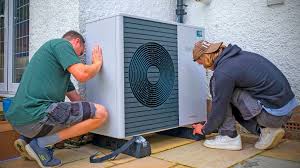Heat pumps are increasingly gaining attention as an efficient and green alternative to conventional cooling and heating systems. They operate by transferring heat instead of creating it, making them a more energy-efficient option for maintaining comfortable indoor temperatures year-round.
What Is a Heat Pump?
An heat pump (tepelné čerpadlo) is a device that transfers heat from one place to another. It is comprised consisting of an outdoor and an indoor unit that is connected via refrigerant lines. The system uses refrigerant that absorbs releases heat as it circulates throughout the system. In winter, it pulls heat from outside air (even even when the temperature is cold) and uses it to heat your home. In the summer, the process is reversed as the pump takes heat from the inside, and then releases it out, thereby cooling your home.
Types of Heat Pumps
Air Source Heat Pumps (ASHPs) The ASHPs are the most commonly used and operate by exchanging heat with outside air. They are further subdivided into:
Heating devices that transfer heat from the air inside and out.
Air-to-Water Heat Pumps: Transfer heat into the water in a hydronic system, which then heats your home via radiant heating or beneathfloor heating.
Ground Source Heat Pumps (GSHPs) Also known as geothermal heat pumps these systems transfer heat to the ground. They are typically much more effective than air source pumps since ground temperatures are relatively constant throughout the year.
Water source heat pumps They use water from a lake, well or river to serve as a heat exchange medium. They are not as common, however, they are extremely efficient if you have a suitable water source near.
Benefits of Heat Pumps
High Efficiency in Energy: Heat pumps can provide up to three times more heat energy to a home than the electricity they consume. This can yield substantial savings on energy costs compared to traditional heating systems.
The environmental impact: Through decreasing reliance upon fossil fuels, pump help reduce carbon emissions, making them a greener choice to heat and cool.
The versatility: Heat pumps offer both cooling and heating capabilities that make them a flexible option for comfort all year round.
Lasting power: With regular maintenance the heat pump are able to last for up to 15 years. That’s more than many conventional cooling and heating systems.
Considerations
Initial Cost: Heat pumps can have more upfront costs compared to conventional systems. However, this can be offset through lower running costs and potential government incentives.
Efficiency at extreme temperatures The modern heat pump are effective in a wide temperature range but their efficiency can decrease in extremely cold climates. It’s important to choose a system suited to the climate of your area.
In summary the heat pumps are an investment that is beneficial for green energy and sustainability. They can provide cooling and heating, along with long-term savings and a smaller carbon footprint, make them a desirable alternative for modern homes.


